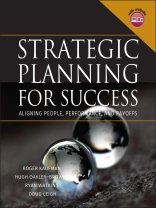Strategic Planning for Success offers you a pragmatic guide to the design and development of practical and pragmatic strategic thinking and organizational alignment that will yield high-impact results and measurably add value to you, your organization, your clients, and society. Unlike other books on the topic, this volume goes beyond simply detailing the tools and techniques of design and development by clearly showing how to align what you do with what will be most valuable to all stakeholders. Using this unique approach will yield extraordinary results adding measurable value that flows from individual performance accomplishment to organizational and societal contributions.
Jadual kandungan
List of Tables and Figures xiii
Preface xix
Introduction 1
1 Busting Old Paradigms and Using New Ones: Defining and Shaping Our Future 4
Chapter Goals 4
Today’s Paradigms 5
The New Realities 16
Ignoring the New Realities 18
Paradigms That Work 25
Create a Better Future 27
Summary 34
2 Critical Success Factors For Strategic Thinking That Works 39
Chapter Goals 39
Six Critical Success Factors for Strategic Thinking and Planning 40
Is Change Strategic? 42
The Strategic Thinking and Planning Process 44
The Consequences of Ignoring the Critical Success Factors 51
3 System (And Systems) Thinking 57
Chapter Goals 57
The Organizational Elements Model 58
Defining the Organizational Elements 64
The Organizational Elements Describe a System 72
The Organizational Elements—Useful Applications 79
Planning from a Helicopter vs. Planning from the Ground 79
4 Preparing To Plan: Ensuring You Do The Right Thing And Not Simply Do Things Right 81
Chapter Goals 81
The Strategic Planning Process 84
Preparing to Plan 89
Mega Level Visioning: Committing to the Longest View 96
Assessing Resistance to Change 102
Barriers—Common Mistakes Made by Strategic Planners 103
5 Assessing Needs: Defining the Critical Gaps in Results . . . And Putting Them in Priority Order 111
Chapter Goals 111
Needs Assessment or Wants Assessment? 112
Defining Needs and Wants 113
Needs Assessment Benefits 123
The Organizational Elements 126
The Needs Assessment Process 131
Gathering the Data 138
Data Gathering Methods 143
Selecting Priority Needs 152
Will the Needs Assessment Work? 154
6 Solving Problems: Closing the Priority Gaps 158
Chapter Goals 158
Solving Problems—An Overview 159
Two Common Problem Solving Errors 164
Errors in Formulating the Problem 165
Simple Problem Solving 167
Complex Problem Solving 173
7 Developing Smarter Objectives: Thinking Audaciously, Beingaudacious, Delivering High Payoff Results 187
Chapter Goals 187
Why Objectives? 188
Categories of Objectives 193
“Smarter” Criteria for High Impact Objectives 194
Identify Key Result Areas 203
Select Performance Indicators 207
Detecting Non-Smarter Objectives 213
Develop Mission Objectives 218
Summary 221
8 Creating Change: Making Sure the Change Effort Really Brought About Change 224
Chapter Goals 224
Creating and Managing the Change from Present Results to Desired Results 225
Transition Management Plan 226
The Paradox of Building Commitment Through Pain 231
Define Key Roles for Change 234
Develop Sponsorship 241
Preparing Change Agents and Advocates 244
Managing Resistance Effectively 247
Force Field Analysis 250
9 Scoping And Scanning The Organization: What Means Will Achieve The High Payoff Results 257
Chapter Goals 257
Scoping and Scanning 258
SWOT Analysis 259
Analyzing the Business Logic 271
The Relationships Among the Business Logics 284
The Cultural Screen 286
10 Delivering High Payoff Results 308
High Payoff Results 310
Fourteen Steps to Useful Results and Performance 319
A General Problem Solving Process Model 327
Avoiding Success 328
Summary 330
Appendix A: Paradigm Shift for Teaching/Learning 331
Appendix B: A Glossary and Classification of Terms and Tools 341
Appendix C: A Suggested Code of Professional Conduct for Defining and Delivering High Payoff Results 355
References 363
Index 373
About the Authors 383
About the International Society for Performance Improvement 387
Mengenai Pengarang
The Authors
Roger Kaufman is director of Roger Kaufman & Associates and professor and director of the Office for Needs Assessment and Planning at Florida State University.
Hugh Oakley–Browne is managing director and founder of Hugh Oakley-Browne and Associates in New Zealand, and a performance improvement executive with BHP in Australia.
Ryan Watkins is an assistant professor at George Washington University in Washington, D.C.
Doug Leigh is an assistant professor at Pepperdine University, Los Angeles, California.












